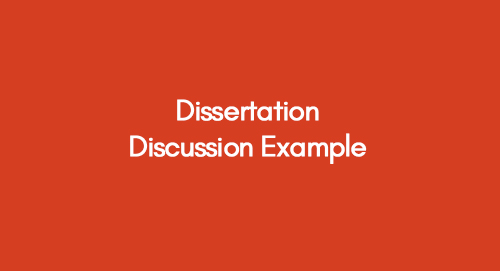What is the main difference between qualitative and quantitative research methods?
November 23, 2022
How to Overcome the Feeling of Failure after Missing a Dissertation Deadline
November 24, 2022A dissertation is a written document that summarizes the research. It is the final step of a PhD program and the culmination of your years of hard work. In the discussion chapter, you dive into your findings' meaning, importance, and relevance. It is important to ensure that you are clear, concise, and easy to understand. This article will cover almost everything you need to understand about a discussion chapter in your dissertation with dissertation discussion examples.
You may also check the discussion section from the complete dissertation discussion example listed below;
What is a Discussion Chapter, and Why is it Important for Your Dissertation?
One of the key components of your dissertation is a discussion chapter. In the discussion chapter, you interpret your data and draw conclusions based on your findings. It is also the section where you reflect on your study's limitations and makes recommendations for future research.
A separate discussion chapter is not always required in a dissertation, but including one is a good idea. This chapter provides an opportunity to discuss the study results in depth and to put them into context. It demonstrates your analytical skills and allows you to reflect on the research process.
The discussion chapter should be divided into two parts: a general discussion of the findings and a more specific discussion of the implications for future research.
- You will need to summarize the study's main findings in the first part. You should then discuss how these findings fit with what was already known about the topic and what they might mean for theory or practice.
- In the second part, you will need to identify gaps in the current research and suggest areas for future investigation. It is where your primary data will be most useful. By critically analyzing your data, you can contribute new insights to your topic's existing body of knowledge.
For example, suppose a study found that most people prefer online shopping to in-person shopping. In that case, the author could discuss possible reasons for this preference, such as convenience or greater selection. By providing a thoughtful interpretation of the data, authors can ensure that their discussion chapter is informative and engaging.
What should be Included in Your Discussion Chapter?
As depicted in the above dissertation discussion examples, a good dissertation discussion chapter should have the following elements.
1. A Review of the Literature
When writing a discussion chapter, reviewing the literature, you have covered in your study is important. That will give your discussion context and remind the reader of the key ideas. It is also important to critically evaluate the literature, as this will help identify gaps or limitations in the existing research.
Check out this dissertation discussion example from the top researcher in the UK and see how the literature review is narrated in discussion in a professional way.
2. An Evaluation of Your Research Methods
In your discussion chapter, you should also evaluate the research methods used in your study. It includes discussing the strengths and weaknesses of your chosen methodology and data collection techniques. It is also important to discuss any limitations that may have affected your results.
3. A Discussion of Your Results
The discussion section is where you will discuss the results of your study in detail. That includes discussing both the quantitative and qualitative data that you collected. It is important to interpret your results considering the literature review and research methods sections, as this will help to put them into context.
4. Implications of Your Findings
In addition to discussing your results, you should also discuss the implications of your findings. This includes discussing your findings for theory, practice, and future research. It is also important to consider any ethical implications relevant to your study.
5. Recommendations for Future Research
Finally, you should conclude your discussion chapter with recommendations for future research. It includes identifying areas that require further investigation and suggesting possible directions for future research.
A Strong Discussion Chapter Communicating Your Findings to Readers
- Start with a strong introduction that outlines the purpose of the discussion chapter.
- Summarize the main findings of the study in the discussion chapter.
- Talk about the ramifications of the results and how they further our knowledge of the subject.
- Compare and contrast the findings with other studies on the same topic.
- Conclude with a statement that summarizes the key points of the discussion chapter.
Take a look at this dissertation discussion example. It contains all the elements you need for an engaging, creative piece of writing!
"The advancement of technology has significantly contributed to the banking sector as many of the traditional banking had been conducting their operations through internet banking. The focus of every bank is to provide the best quality service to its customers, fulfilling their needs and providing an excellent experience. The E-banking services are mainly provided through two major channels: the online website portal and the mobile application.
According to the study of Yee-Loong et al. (2010), online banking provides a wide range of services to customers as they can transfer money, pay utility bills, recharge their mobile and access their financial statements. Consumers are faced with various issues while following the traditional method of conducting the financial transaction as they are required to personally visit the branch as well as wait in a long queue to perform their banking activities.
Moreover, the results from the frequency analyses demonstrated that customers need banking services to be available 24 hours a day. This highlights the importance of online banking as the banks are usually open for 9 hours, whereas online banking enables them to perform their transactions 24/7. The online banking service has also enabled customers to save time in conducting their banking transactions without needing to visit the branch during their working times. The main key feature that enables the customer to open their account is online banking, which leads to performing a wide range of activities.
Moreover, many respondents strongly agreed that online banking enables them to access their account details anytime and without needing to visit the banks. The participants have also recognized that the risk involved in internet banking is lower than using mobile phones or visiting the branch.
Similarly, the study of Martins, Oliveira and Popovič (2014) showed that mobile banks are highly exposed to hacking threats. Online banking also ensures that the account details are always protected and secure, increasing the customers' reliability and trust. Many participants were even willing to open their bank account in a financial institution with no physical branch but only outstanding online banking and mobile banking apps. Therefore, the results of the questionnaire analysis demonstrate the high importance of online banking these days, which provides convenience, security, reliability and easiness to the customers."
Tips and Tricks for Writing a Great Discussion Chapter
As you have already gone through the dissertation discussion examples on writing a discussion chapter, here are the best tips and tricks to craft an amazing chapter.
1. Start with an Outline
The discussion chapter should be well-structured and organized. We recommend starting with an outline to help you stay on track. Include an introduction, body paragraphs, and a conclusion.
2. Keep it Focused
The discussion chapter should focus on the implications of your findings. What do your results mean? How do they contribute to the existing body of knowledge on your topic? Remember that you are not just summarizing your findings but also interpreting them.
3. Use Evidence
Include concrete evidence from your research in your discussion chapter. This could include quotes from interviews, surveys, data from experiments, etc. Be sure to cite your sources according to the style guide required by your university (APA, MLA, Chicago, etc.).
4. Be Concise
Your discussion chapter should be concise and to the point. Ensure that each sentence serves a purpose and that there is no filler content. Cut out anything that does not directly contribute to your argument.
5. Use Simple Language
Use language that is easy for everyone to understand. Avoid using jargon or acronyms unless you are sure that your reader will know what they mean. Remember that your discussion chapter should be accessible to scholars in other disciplines as well as those outside of academia altogether.
6. Edit and Proofread
Once you have finished writing your draft, put it away for a day or two before coming back to edit it with fresh eyes. Pay attention to grammar, spelling, and style issues during editing. You might also wish to have a second set of eyes go through your work for any mistakes you might have overlooked.
Conclusion
Completing a discussion chapter for a dissertation is the final step of a PhD program and your years of hard work. Writing this section can be challenging, but producing a well-crafted and effective discussion is important. The tips we have provided should help you start writing your discussion chapter. If you need additional assistance, Premier Dissertation offers expert writing services to help you complete your dissertation quickly and effectively.
Contact us today to learn more about how we can help you finish your degree program successfully.
Below are some more resources on crafting an amazing dissertation;
Get 3+ Free Dissertation Topics within 24 hours?



























